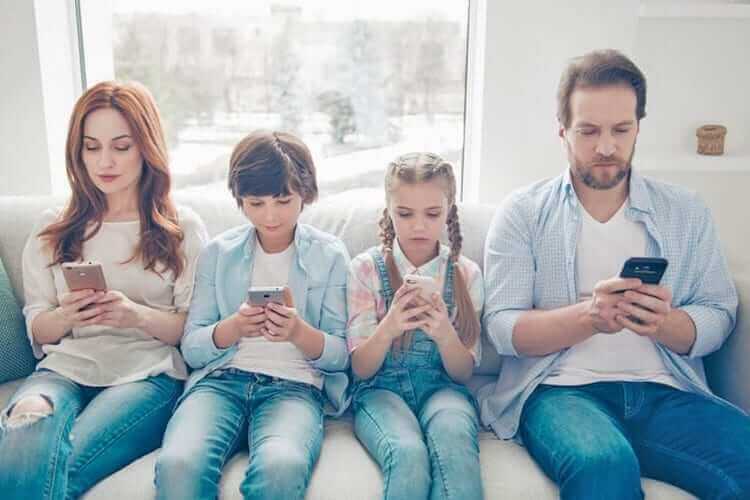在前面给大家分享的纽约时报精读:5G时代已经到来,你需要知道这些,相信很多朋友已经“看到”了5G,有了网络以后,人们随是都会用手机,而且现在,似乎人们都已经被手机所绑架了。离开一会手机就会觉得焦虑,不安,这可能就是现代人的通病吧。
你想过这样的问题吗?现在的小朋友也逐渐成为了手机的“受害者”,今天给大家分享的这篇来自纽约时报的文章从另外一个角度探讨了这个问题。文章源自西贝博客-https://qinghe.me/a-dark-consensus-about-screens-and-kids-begins-to-emerge-in-silicon-valley.html
想看看纽约时报双语阅读其他文章,可以看看:文章源自西贝博客-https://qinghe.me/a-dark-consensus-about-screens-and-kids-begins-to-emerge-in-silicon-valley.html
纽约时报双语阅读:25年了,为什么我们还是爱看《老友记》?文章源自西贝博客-https://qinghe.me/a-dark-consensus-about-screens-and-kids-begins-to-emerge-in-silicon-valley.html
纽约时报双语阅读:中国首只克隆猫诞生背后的故事文章源自西贝博客-https://qinghe.me/a-dark-consensus-about-screens-and-kids-begins-to-emerge-in-silicon-valley.html
我们来看看:文章源自西贝博客-https://qinghe.me/a-dark-consensus-about-screens-and-kids-begins-to-emerge-in-silicon-valley.html
技术专家的警惕
San Francisco — The people who are closest to a thing are often the most wary of it. Technologists know how phones really work, and many have decided they don’t want their own children anywhere near them.文章源自西贝博客-https://qinghe.me/a-dark-consensus-about-screens-and-kids-begins-to-emerge-in-silicon-valley.html
旧金山——对一件东西愈了解往往就愈警惕。技术专家们知道手机的运作原理,所以许多人拿定主意,不让自己的孩子靠近手机。文章源自西贝博客-https://qinghe.me/a-dark-consensus-about-screens-and-kids-begins-to-emerge-in-silicon-valley.html
A wariness that has been slowly brewing is turning into a regionwide consensus: The benefits of screens as a learning tool are overblown, and the risks for addiction and stunting development seem high. The debate in Silicon Valley now is about how much exposure to phones is O.K.文章源自西贝博客-https://qinghe.me/a-dark-consensus-about-screens-and-kids-begins-to-emerge-in-silicon-valley.html
有一种谨慎的态度一直在发酵中,如今这种态度变成了地区性共识:屏幕作为学习工具的好处被夸大了,上瘾和阻碍孩子发育的风险似乎很高。如今硅谷争论的是,接触手机到什么程度是合适的。文章源自西贝博客-https://qinghe.me/a-dark-consensus-about-screens-and-kids-begins-to-emerge-in-silicon-valley.html
“Doing no screen time is almost easier than doing a little,” said Kristin Stecher, a former social computing researcher married to a Facebook engineer. “If my kids do get it at all, they just want it more.”文章源自西贝博客-https://qinghe.me/a-dark-consensus-about-screens-and-kids-begins-to-emerge-in-silicon-valley.html
“不看屏幕比花一点点时间看屏幕要容易,”嫁给了一位Facebook工程师的前社会计算研究者克里斯廷·施特歇尔(Kristin Stecher)表示。“如果我的孩子有使用屏幕的时间,那他们只会想要更多。”
除了手机,还有其他方式
Ms. Stecher, 37, and her husband, Rushabh Doshi, researched screen time and came to a simple conclusion: they wanted almost none of it in their house. Their daughters, ages 5 and 3, have no screen time “budget,” no regular hours they are allowed to be on screens. The only time a screen can be used is during the travel portion of a long car ride (the four-hour drive to Tahoe counts) or during a plane trip.
37岁的施特歇尔和丈夫鲁沙巴·多希(Rushabh Doshi)一直在对使用屏幕的时间长短进行研究,他们得出了一个简单的结论:他们基本上不希望家里有人使用屏幕。他们有两个女儿,一个五岁,一个三岁,两个孩子完全没有使用屏幕时间的“预算”,也就是说,他们完全不允许两个孩子有定期使用屏幕的时间。唯一能使用屏幕的时候,是在长时间坐车期间(开车四小时去塔霍湖的路上),或是在坐飞机的时候。
Recently she has softened this approach. Every Friday evening the family watches one movie.There is a looming issue Ms. Stecher sees in the future: Her husband, who is 39, loves video games and thinks they can be educational and entertaining. She does not.
最近,她软化了这一立场。每周五,这家人都会看一部电影。在施特歇尔看来,未来存在一个迫在眉睫的问题:她39岁的丈夫爱打电子游戏,并且认为电子游戏既有教育意义,又有娱乐性。她可不这么认为。
“We’ll cross that when we come to it,” said Ms. Stecher, who is due soon with a boy.
“遇到这个问题时,我们会出现冲突,”即将诞下一名男孩的施特歇尔说。
除了手机,还有其他方式
Some of the people who built video programs are now horrified by how many places a child can now watch a video.
如今孩子能看视频的地方之多,让一些打造视频节目的人感到震惊。
Asked about limiting screen time for children, Hunter Walk, a venture capitalist who for years directed product for YouTube at Google, sent a photo of a potty training toilet with an iPad attached and wrote: “Hashtag ‘products we didn’t buy.’”
当被问及限制孩子使用屏幕的时间时,在谷歌(Google)为YouTube进行产品指导的风险投资人亨特·沃克(Hunter Walk)发来了一张图片,上面显示着一个带有iPad训练孩子上厕所的便盆,他写道:“#‘我们不认同的产品’”。
Athena Chavarria, who worked as an executive assistant at Facebook and is now at Mark Zuckerberg’s philanthropic arm, the Chan Zuckerberg Initiative, said: “I am convinced the devil lives in our phones and is wreaking havoc on our children.”
曾在Facebook担任行政助理,如今在马克·扎克伯格(Mark Zuckerberg)的慈善机构“陈-扎克伯格行动”(Chan Zuckerberg Initiative)任职的阿西纳·查瓦里亚(Athena Chavarria)说:“我深信我们的手机里有恶魔,并且这个恶魔正在对我们的孩子造成伤害。”
Ms. Chavarria did not let her children have cellphones until high school, and even now bans phone use in the car and severely limits it at home.
直到高中,查瓦里亚都不让自己的孩子拥有手机,并且即便是现在,她也仍然禁止在车里使用手机,家里使用手机也严格受限。
She said she lives by the mantra that the last child in the class to get a phone wins. Her daughter did not get a phone until she started ninth grade.
她说自己信奉一句俗话,即班上的赢家是最后一个有手机的孩子。她的女儿直到九年级开始时,才有了一部手机。
“Other parents are like, ‘Aren’t you worried you don’t know where your kids are when you can’t find them?’” Ms. Chavarria said. “And I’m like, ‘No, I do not need to know where my kids are every second of the day.’”For longtime tech leaders, watching how the tools they built affect their children has felt like a reckoning on their life and work.
“其他父母会说,‘当你找不到孩子的时候,你不担心他们在哪儿吗?’”查瓦里亚说。“我说,‘不担心,我不需要每分每秒都知道我的孩子们在哪里。’”对于在科技业长期担任领导人的人士来说,看着这些他们打造的工具对自己孩子的影响,感觉就像是对他们生活和工作的一种报应。
Among those is Chris Anderson, the former editor of Wired and now the chief executive of a robotics and drone company. He is also the founder of GeekDad.com.
在这些人当中,就有《连线》(Wired)前主编克里斯·安德森(Chris Anderson)。他目前是一家机器人和无人机公司的首席执行官,并且创办了GeekDad.com。
“On the scale between candy and crack cocaine, it’s closer to crack cocaine,” Mr. Anderson said of screens.
“在糖果和可卡因之间,它更接近于可卡因,”安德森如此评价那些屏幕。
Technologists building these products and writers observing the tech revolution were naïve, he said.
打造出这些产品的技术专家和观察科技革命的作者们都很天真,他说。
“We thought we could control it,” Mr. Anderson said. “And this is beyond our power to control. This is going straight to the pleasure centers of the developing brain. This is beyond our capacity as regular parents to understand.”
“我们以为能控制它,”安德森说。“但它已经超越了我们的控制能力。它直接被传送到了正在发育的大脑的愉悦中枢。这超越了我们作为普通父母的理解能力。”
控制使用频率
He has five children and 12 tech rules. They include: no phones until the summer before high school, no screens in bedrooms, network-level content blocking, no social media until age 13, no iPads at all and screen time schedules enforced by Google Wifi that he controls from his phone. Bad behavior? The child goes offline for 24 hours.
他有五个孩子,给他们定了12条与科技相关的规则。其中包括:上高中前的那个暑假才能有手机;卧室里不能有屏幕;网络级内容屏蔽;13岁才能用社交媒体;绝对禁止使用iPad;对使用屏幕的时间设下时间表,该时间表由谷歌Wifi执行,他可以从自己的手机上进行控制。孩子不听话?那就断网24小时。
“I didn’t know what we were doing to their brains until I started to observe the symptoms and the consequences,” Mr. Anderson said.“This is scar tissue talking. We’ve made every mistake in the book, and I think we got it wrong with some of my kids,” Mr. Anderson said. “We glimpsed into the chasm of addiction, and there were some lost years, which we feel bad about.”
“直到我注意到症状和后果前,我都不知道我们对他们的大脑做了什么,”安德森说。“这可是瘢痕组织在说话。我们犯下了规则里的所有错,而且我认为,我们在孩子身上犯了错,”安德森说。“我们看到了上瘾的深渊,错了几个年头,对此我们感到很遗憾”。
His children attended private elementary school, where he saw the administration introduce iPads and smart whiteboards, only to “descend into chaos and then pull back from it all.”
他的子女上的是私立小学,他看到学校会用iPad和智能白板,结果“陷入了混乱,之后从中退出”。
This idea that Silicon Valley parents are wary about tech is not new. The godfathers of tech expressed these concerns years ago, and concern has been loudest from the top.
硅谷父母对科技感到担忧并非新鲜事。科技教父们多年前就曾表达过这些担忧,来自最顶层人士的担心声音最大。
大佬们的想法
Tim Cook, the C.E.O. of Apple, said earlier this yearthat he would not let his nephew join social networks. Bill Gates banned cellphones until his children were teenagers, and Melinda Gates wrote that she wished they had waited even longer. Steve Jobs would not let his young children near iPads.
苹果(Apple)CEO蒂姆·库克(Tim Cook)今年早些时候表示,他不会让自己的侄子上社交网络。比尔·盖茨(Bill Gates)禁止他的孩子在十几岁之前用手机,而梅琳达·盖茨(Melinda Gates)曾写道,她希望他们可以再晚一些给孩子手机。史蒂夫·乔布斯(Steve Jobs)不会让自己年幼的孩子靠近iPad。
But in the last year, a fleet of high-profile Silicon Valley defectors have been sounding alarms in increasingly dire terms about what these gadgets do to the human brain. Suddenly rank-and-file Silicon Valley workers are obsessed. No-tech homes are cropping up across the region. Nannies are being asked to sign no-phone contracts.
但在去年,对于这些电子产品对人脑的影响,一群著名硅谷变节者发出了越来越可怕的警告。突然间,硅谷的普通员工对这个概念痴迷了起来。整个地区突然出现了各种对高科技电子产品说不的家庭。保姆们被要求签署不用手机的合同。
Those who have exposed their children to screens try to talk them out of addiction by explaining how the tech works.
那些让孩子接触屏幕的人,试图通过解释科技的运作原理,说服他们戒除屏幕瘾。
John Lilly, a Silicon Valley-based venture capitalist with Greylock Partners and the former C.E.O. of Mozilla, said he tries to help his 13-year-old son understand that he is being manipulated by those who built the technology.
在硅谷工作的Greylock Partners公司风险投资人约翰·利利(John Lilly)表示,他试图帮助自己13岁的儿子理解,他受到了那些打造这些科技产品的人的操纵。利利曾是摩斯拉(Mozilla)的前CEO。
寻找解决方案
“I try to tell him somebody wrote code to make you feel this way — I’m trying to help him understand how things are made, the values that are going into things and what people are doing to create that feeling,” Mr. Lilly said. “And he’s like, ‘I just want to spend my 20 bucks to get my Fortnite skins.’”
“我尽力告诉他,有人专门写代码,就是为了让你有这种感受——我在试图帮他理解这些东西是如何被打造出来的,这些东西其中的价值观,以及为了创造出这种感觉,人们都做了什么,”利利说。“他的反应是,‘我只想花20美元,拿到《堡垒之夜》(Fortnite)的皮肤’。”
And there are those in tech who disagree that screens are dangerous. Jason Toff, 32, who ran the video platform Vine and now works for Google, lets his 3-year-old play on an iPad, which he believes is no better or worse than a book. This opinion is unpopular enough with his fellow tech workers that he feels there is now “a stigma.”
此外,科技业还有一些人,不同意屏幕很危险的观点。32岁的杰森·托夫(Jason Toff)曾运营视频平台Vine,如今是谷歌的员工,他会让自己三岁的儿子玩iPad。在他看来,iPad和一本书没什么差别。这种观点在他的科技业同行那里不怎么受欢迎,以至于他觉得现在这是“一种不光彩的感觉”。
“One reaction I got just yesterday was, ‘Doesn’t it worry you that all the major tech execs are limiting screen time?’” Mr. Toff said. “And I was like, ‘Maybe it should, but I guess I’ve always been skeptical of norms.’ People are just scared of the unknown.”
“昨天我得到的一种回应是,‘所有主要的科技公司高管都在限制屏幕使用时间,你不担心吗?’”托夫说。“我的回答是,‘也许它应该被限制,但我可能对标准行为一直都持怀疑态度。’人们只是害怕未知。”
“It’s contrarian,” Mr. Toff said. “But I feel like I’m speaking for a lot of parents that are afraid of speaking out loud for fear of judgment.”
“这有些离经叛道,”托夫表示。“但我觉得自己是在为许多因为担心被指指点点,而不敢大声说出来的父母发声。”
He said he thinks back to his own childhood growing up watching a lot of TV. “I think I turned out O.K.,” Mr. Toff said.
他说,回想起自己小时候看了很多电视。“我觉得我最后也没什么问题,”托夫表示。
想了解通过外刊如何提高学习水平的文章,可以看看:





评论